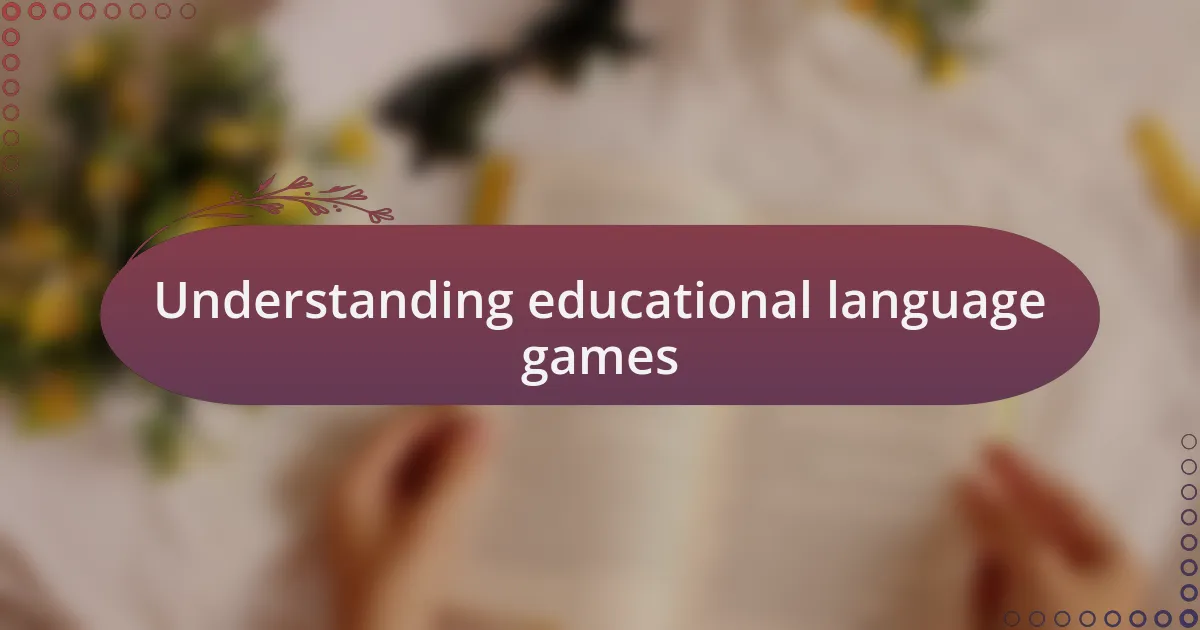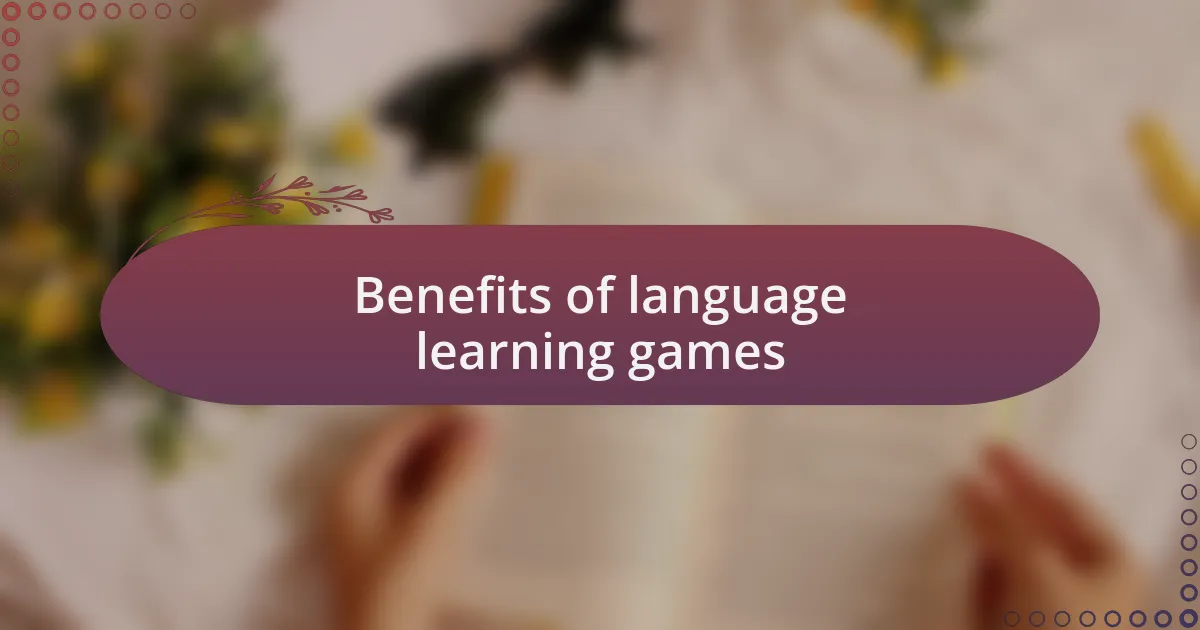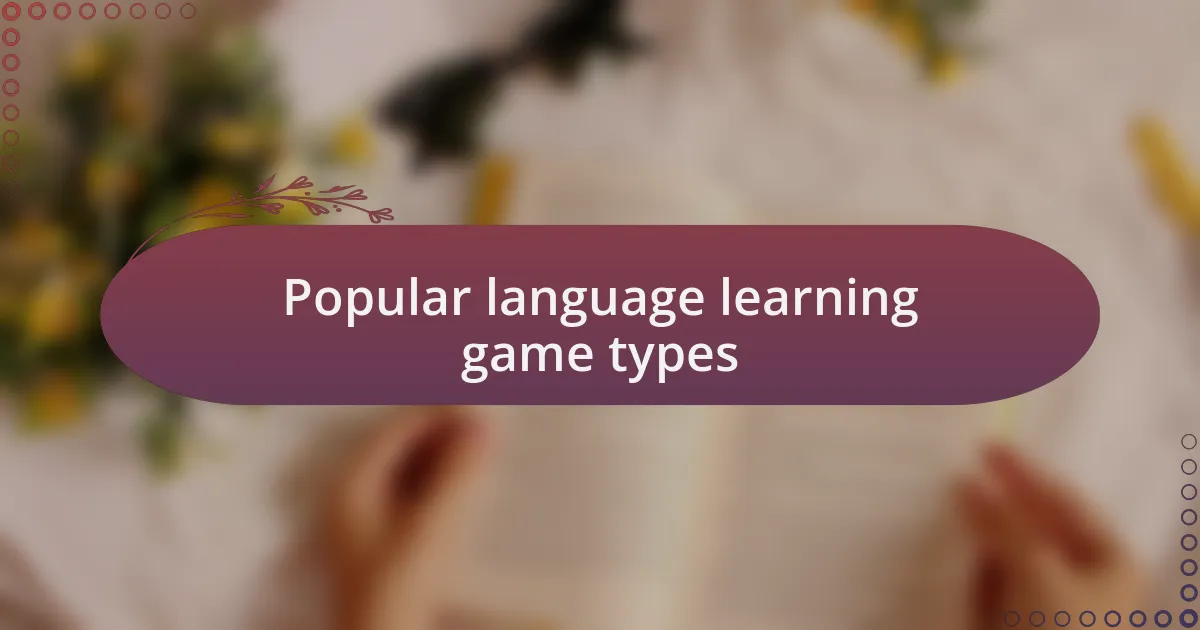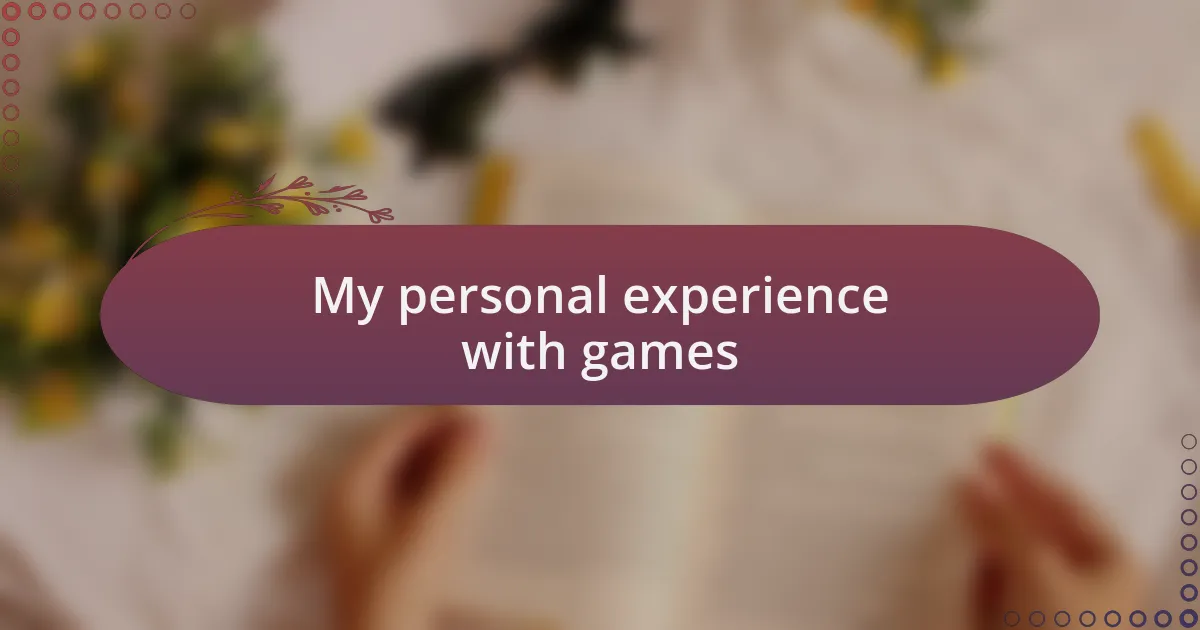Key takeaways:
- Educational language games enhance motivation and learning by turning vocabulary building into enjoyable competitions and providing instant feedback.
- Popular game types like quiz-based games, RPGs, and interactive storytelling foster engagement and practice of language skills in immersive ways.
- Collaboration in language games promotes social interaction, reduces isolation, and emphasizes community support in the learning experience.
- Key lessons from using these games include the importance of persistence, adaptability in learning strategies, and celebrating small victories to maintain motivation.

Understanding educational language games
Educational language games serve as dynamic tools that transform the learning process into an engaging experience. I remember the first time I tried a language app that turned vocabulary building into a fun competition. The thrill of racing against a timer made me realize how stimulating learning could become when it’s intertwined with play.
These games often incorporate mechanics that simulate real-world interactions, which I find incredibly beneficial. For instance, role-playing scenarios allowed me to practice my conversational skills in a stress-free environment. Have you ever found yourself more at ease speaking a new language when you’re enjoying a game? It’s fascinating how the pressure of traditional learning fades away in these playful contexts.
Moreover, educational language games can cater to various learning styles, making them inclusive for everyone. I once participated in a language exchange game where visual cues, sounds, and even storytelling worked together to reinforce lessons. This multilayered approach enhanced my retention and understanding, and I wondered: could this be the key to unlocking language learning for so many others? The answer became clear as I realized how effective and enjoyable this method can be for diverse learners.

Benefits of language learning games
The first benefit of language learning games is the boost in motivation they provide. I recall a time when a simple vocabulary game transformed my evening routine into something I actually looked forward to. Have you ever felt that rush of excitement when you beat your own score? That sense of achievement fuels the desire to learn more, helping to create a positive feedback loop.
Another significant advantage is how these games promote social interaction. I once joined an online game that paired me with players from around the world. Engaging in conversation with native speakers not only improved my language skills but also opened my eyes to different cultures. Isn’t it amazing how a game can connect people across distances while enhancing language fluency?
Additionally, language games often provide immediate feedback, which I find incredibly useful. When I played a grammar quiz, the instant corrections helped me grasp my mistakes right away. This not only reinforced my learning but also reduced the frustration often associated with traditional exercises. Doesn’t it make sense that prompt guidance can lead to better understanding? I believe this immediacy is a game-changer for learners at all levels.

Popular language learning game types
When it comes to popular language learning game types, quiz-based games stand out for their versatility. I remember diving into a vocabulary quiz app that challenged my understanding of words in fun and engaging ways. Could anything be more satisfying than answering a question correctly after grappling with the vocabulary? It not only reinforced my memory but also made learning feel like a playful challenge.
Another favorite type is role-playing games (RPGs), which allow users to immerse themselves in a narrative while practicing their language skills. In one RPG, I found myself navigating through a fantasy world where every conversation pushed my language prowess to the limits. It was thrilling to interact with characters that spoke to me in the language I was learning, making every dialogue a chance to experiment. How often do we get to blend storytelling with education?
Then there are interactive storytelling games, which transform language learning into a captivating experience. I vividly recall one such game where my choices influenced the storyline. It made me feel responsible for my learning—each decision sharpened my language skills as I carefully chosen the right phrases to progress. Have you ever felt ownership over your learning journey? These games not only taught me words and phrases but also engaged my imagination, making the process unforgettable.

My personal experience with games
Engaging with language learning games has been a transformative experience for me. I vividly recall a particular instance when I stumbled upon a competitive vocabulary-building game. The thrill of racing against time, coupled with the adrenaline of competing with others, made me realize how much fun learning could be. It’s fascinating how that element of competition not only challenged me but also boosted my retention of new words. Have you ever felt your heart race while trying to remember a word just to gain that extra point?
One game that truly stood out was a simulation where I had to navigate a foreign city and communicate with locals. I still remember how apprehensive I felt trying to order food in that unfamiliar language. Yet, the laughter and moments of awkwardness that ensued created a light-hearted atmosphere, turning my fear of speaking into a joyful experience. It really emphasized the idea that making mistakes is part of the learning journey. How much have you learned from your own missteps?
Finally, I discovered a collaborative language game that required players to work together to solve puzzles. This experience was eye-opening; I often found myself leaning on others for help while contributing my own knowledge. The collective effort emphasized not just individual growth but also the importance of community in learning. How do we often overlook this aspect? These collaborative games made language learning feel less isolating and more supportive, reinforcing the idea that we’re all in this together.

Lessons learned from my journey
The most profound lesson I learned was the impact of persistence when faced with challenges. I recall a particularly tricky grammar game where I struggled to grasp the nuances of verb conjugation. Each failure became less discouraging and more of a stepping stone. It was in those moments of frustration that I realized success doesn’t come from never failing but from getting back up every time. Can you think of a time when perseverance paid off for you?
Another valuable takeaway was discovering the importance of adaptability in my learning approach. I still remember shifting strategies mid-game when I realized my initial tactics weren’t yielding the results I wanted. By being open to trying new techniques, I not only improved my performance but also deepened my understanding of the language structure. How often do we box ourselves into one way of learning?
Lastly, I’ve come to appreciate the joy of celebrating small victories along the way. In those moments when I finally nailed a vocabulary set or completed a challenging level, I felt a rush of accomplishment. It transformed learning from a daunting task into an engaging journey filled with milestones. Reflecting on this, how crucial do you think it is to acknowledge our small wins in the larger context of learning?

Recommendations for effective game use
To maximize the benefits of language-learning games, it’s crucial to set clear, achievable goals before diving in. I often find that defining what I aim to accomplish—whether it’s expanding my vocabulary or mastering specific grammar points—helps focus my efforts. Have you ever noticed how goals can make even the most challenging tasks feel more manageable?
Another recommendation is to blend gameplay with other learning methods. For me, after playing a particularly engaging game, I would often jot down new words or phrases I encountered and revisit them later. This combination solidified my learning and kept the excitement alive. It raises an interesting question: how can we integrate various techniques to create a richer learning experience?
Lastly, consider the social aspect of these games. Playing with others not only makes the experience more enjoyable but also provides instant feedback and support. I remember when I teamed up with a friend for a competitive language game; collaborating made the process feel less isolating, and I learned so much from our discussions. Can you imagine how sharing those moments could deepen your understanding?